八年级英语瞬间动词与延续性动词
英语短暂性动词和延续性动词
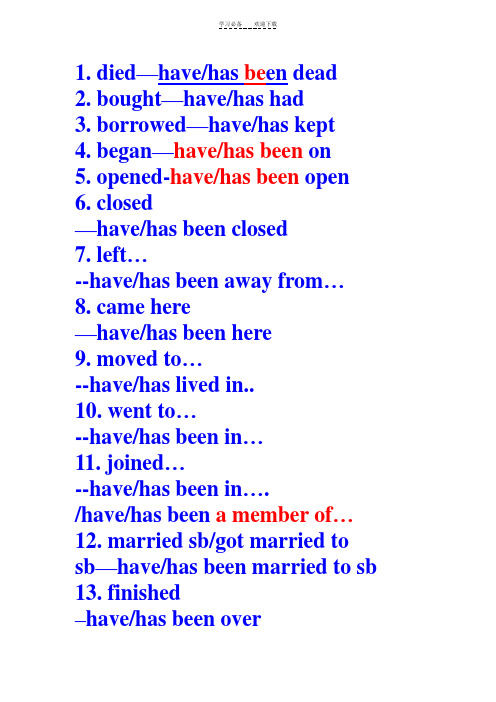
1. died—have/has be en dead2. bought—have/has had3. borrowed—have/has kept4. began—have/has been on5. opened-have/has been open6. closed—have/has been closed7. left…--have/has been away from…8. came here—have/has been here9. moved to…--have/has lived in..10. went to…--have/has been in…11. joined…--have/has been in…./have/has been a member of…12. married sb/got married to sb—have/has been married to sb 13. finished–have/has been over14. made/became friends—have/has been friends15. began to teach—have/has taught16. lose (lost)—haven’t/hasn’t had17.become (became)—have/has been ******************************* * He went to London in 1990. He is still in London now.→He has been in London since 1990. * I borrowed the book two weeks ago. →I have kept the book for two weeks/since two weeks ago.It is two weeks since I borrowed the book.●He joined the League two yearsago. = It is two years since hejoined the League.= He has been in the League for two years/ since two years ago.同义句(用两种方法变):1.The film began ten minutes ago. It is …since….It is ten minutes since the film began. The film has been on for ten minutes/since ten minutes ago.2.It is three days since he left.He left three days ago.He has been away from here for three days/since three days ago.3.He came here half an hour ago,and he is still here now.It is half an hour since he came here. He has been here for half an hour./since half an hour ago.4.Mary married Tom ten years ago. It is ten years since Mary married Tom.Mary has been married to Tom for ten years/since ten years ago.5.I began to teach English fourteenyears ago.It is fourteen years since I began to teach English.I have taught English for fourteen years/since fourteen years ago.I have been an English teacher for 14 years.Test in class1.He moved to Shenzhen two yearsago.It is two years since he moved to Shenzhen.He has lived in Shenzhen for two years/since two years ago.2.My father went to Shanghai lastweek.It is a week since my father went to Shanghai.My father has been in Shanghai since last week.3.Mike joined the army three yearsago.It is three years since Mike joined the army.Mike has been in the army for three years/since three years ago.4.It is ten minutes since the filmbegan.The film began ten minutes ago.The film has been on for ten minutes/since ten minutes ago.5.He bought the computer fourweeks ago.It is four weeks since he bought the computer.He has had the computer for four weeks/since four weeks ago.。
现在完成时中瞬间动词变延续性动词总结
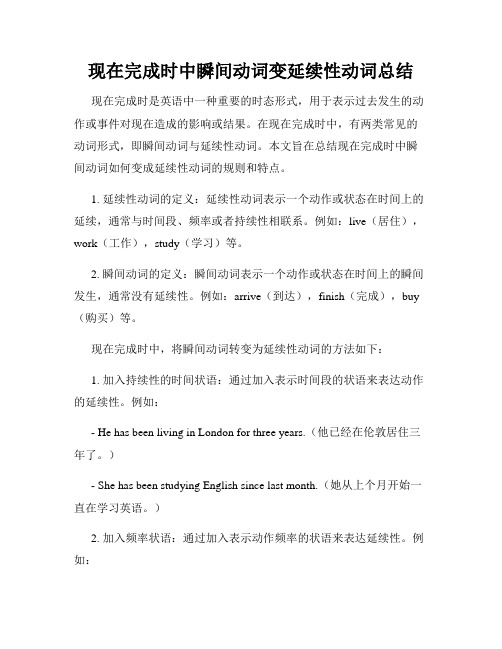
现在完成时中瞬间动词变延续性动词总结现在完成时是英语中一种重要的时态形式,用于表示过去发生的动作或事件对现在造成的影响或结果。
在现在完成时中,有两类常见的动词形式,即瞬间动词与延续性动词。
本文旨在总结现在完成时中瞬间动词如何变成延续性动词的规则和特点。
1. 延续性动词的定义:延续性动词表示一个动作或状态在时间上的延续,通常与时间段、频率或者持续性相联系。
例如:live(居住),work(工作),study(学习)等。
2. 瞬间动词的定义:瞬间动词表示一个动作或状态在时间上的瞬间发生,通常没有延续性。
例如:arrive(到达),finish(完成),buy (购买)等。
现在完成时中,将瞬间动词转变为延续性动词的方法如下:1. 加入持续性的时间状语:通过加入表示时间段的状语来表达动作的延续性。
例如:- He has been living in London for three years.(他已经在伦敦居住三年了。
)- She has been studying English since last month.(她从上个月开始一直在学习英语。
)2. 加入频率状语:通过加入表示动作频率的状语来表达延续性。
例如:- They have been playing tennis every weekend.(他们每个周末都在打网球。
)- I have been working out at the gym twice a week.(我每周在健身房锻炼两次。
)3. 加入表示动作状态的状语:通过加入表示动作状态的状语来表达延续性。
例如:- The team has been practicing hard for the upcoming tournament.(这个团队一直在为即将到来的比赛进行努力训练。
)- She has been studying diligently for her exams.(她为了考试一直努力学习。
初中英语短暂性动词转换为延续性动词
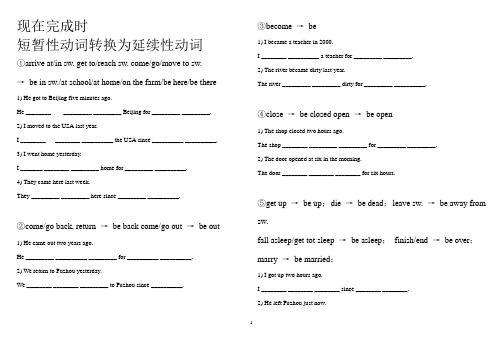
现在完成时短暂性动词转换为延续性动词①arrive at/in sw. get to/reach sw. come/go/move to sw.→be in sw./at school/at home/on the farm/be here/be there 1) He got to Beijing five minutes ago.He ________ _________ _________ Beijing for _________ _________.2) I moved to the USA last year.I ________ ________ __________ the USA since __________ __________.3) I went home yesterday.I _______ ________ _________ home for _________ __________.4) They came here last week.They _________ _________ here since _________ __________.②come/go back, return →be back come/go out →be out1) He came out two years ago.He _________ __________ _________ for __________ __________.2) We return to Fuzhou yesterday.We ________ ________ _________ to Fuzhou since __________. ③become →be1) I became a teacher in 2000.I ________ __________ a teacher for _________ _________.2) The river became dirty last year.The river _________ _________ dirty for _________ __________.④close →be closed open →be open1) The shop closed two hours ago.The shop ________ _________ _________ for _________ _________.2) The door opened at six in the morning.The door ________ ________ ________ for six hours.⑤get up →be up;die →be dead;leave sw. →be away from sw.fall asleep/get tot sleep →be asleep;finish/end →be over;marry →be married;1) I got up two hours ago.I ________ ________ ________ since ________ ________.2) He left Fuzhou just now.He _______ ________ ________ _________ Fuzhou for five minutes.3) My grandpa died in 2002.My grandpa _______ _______ ________for _______ ________.4) The meeting finished at six.The meeting ________ ______ ______ for six hours.5) I got to sleep two hours ago.I ________ _________ _________ since _________ _________.6) They married in 1990.They ________ _________ __________since _________.⑥start/begin to do sth. →do sth. ;begin →be on1) I began to teach at this school in 1995.I ____ ____ at this school since ____.2) The film began two minutes ago.The film ____ ____ ____ for ____ ____.⑦borrow →keep;lose →not have ;buy →have ;put on →wearcatch/get a cold →have a cold;get to know →know1) They borrowed it last week.They _________ _________ it since __________ __________. 2) I bought a pen two hours ago.I _________ _________ a pen for ________ __________.3) I got to know him last year.I _______ _______ him since __________ __________.4) I put on my glasses three years ago.I __________ __________ my glasses for _________ _________.⑧have/has gone to →have been inHe has gone to Beijing.He ____ ____ _____ Beijing for two days.⑨join the league/the Party/the army→be a league/a Party member/a soldier→be a member of the league/the Party→be in the league/the Party/the army1) He joined the league in 2002.He ________ _________ a _________ _________ for two years.He _______ _________ a __________ ___________ the __________ for two years. He ____________ ___________ ___________ the league for two years.2) My brother joined the army two years ago.My brother ________ __________ a ___________ for ___________ ___________. My brother __________ ___________ in ____________ ___________ for two years.。
短暂性动词于延续性动词在现在完成时中的应用

A.have been married
B. have married
C. married
D. has married
9. He ______ at eight yesterday afternoon. A. slept B. was sleeping C. has sleep D. had slept
常见的几个短暂性动词
.begin(start),leave,go, borrow,come,return. join,die,buy,arrive. marry,bec性动词可用来表示某一动作完成, 因此可用于现在完成时。
如: The train has arrived.火车到了。 Have you joined the computer group 你加入电脑小组了吗?
练习:
1. Do you know Huang Ting well
2.
yes,she and I ____ friends since we met in
Wuhan last summer.
3. A. have made B. were C. have been D. had come
4. Mr.Green ___Beijing since three years ago.
3.终止性动词可用于现在完成时否定 式中,成为可以延续的状态,因而 可与表示一段时间的状语连用。
如:
He hasn't left here since 1986.
I haven't heard from my father for two weeks.
延续性动词的用法
1.延续性动词可以用于现在完成时,其 完成时态可与表示“段时间”的状语 连用。表示“段时间”的短语有:for two years, during the past three years, since last year, how long等。如:
英语知识 _ 初中英语,延续性动词和瞬间性动词的用法

一、延续性动词延续性动词,表示的动作不但可以延续,而且可以产生持久的影响。
常见的这类动词有:b e,h a v e,ke e p,k n o w,l e a r n,l i e,l i v e,re a d,s i n g,s l e e p,s t a n d,s t a y,w a i t,w a l k,w a tc h等。
延续性动词的用法很广,但常见于现在完成时中的句子中,且常与f o r,h o w,l o n g,s i n c e 等引导的表示一段时间的状语或状语从句连用。
例如:I h a v e l e a r n e d m o re t h a n1000C h i n e s e w o rd s s i n c e I c a m e t o C h i n a.自从来到中国,我已经学会了l千多个汉字。
I h a v e ke p t t h e p i c t u re f o r a b o u t t h re e y e a r s.。
这张画我保存了大约三年二、瞬间性动词瞬间性动词,又称为终止性动词或非延续性动词,它表示的动作不能延续,也就是说动作一旦发生就立即结束,并产生某种结果。
常见的这类动词有:a c c e p t,a r r i v e,b ec o m e,b e g i n,b o r ro w,b re a k,b u y,c a tc h,c l o s e,c o m e,d i e,e n d,f a l l,f i n i s h,g e t,g i v e,g o,j o i n,l e a v e,p u t,re a c h,re c e i v e,sh u t,s t a r t,s t o p等。
用在现在完成时要注意下面三点:①瞬间性动词可直接用来表示某一动作的完成。
例如:T h e y h a v e re a c h e d S h a n g h a i.他们已经到达了上海。
英语人教版八年级下册现在完成时中延续性动词和短暂性动词的用法
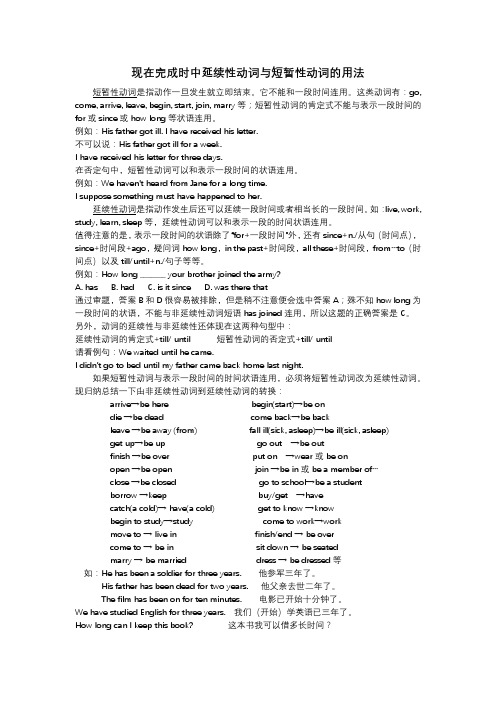
现在完成时中延续性动词与短暂性动词的用法短暂性动词是指动作一旦发生就立即结束。
它不能和一段时间连用。
这类动词有:go, come, arrive, leave, begin, start, join, marry等;短暂性动词的肯定式不能与表示一段时间的for或since或how long等状语连用。
例如:His father got ill. I have received his letter.不可以说:His father got ill for a week.I have received his letter for three days.在否定句中,短暂性动词可以和表示一段时间的状语连用。
例如:We haven’t heard from Jane for a long time.I suppose something must have happened to her.延续性动词是指动作发生后还可以延续一段时间或者相当长的一段时间。
如:live, work, study, learn, sleep等,延续性动词可以和表示一段的时间状语连用。
值得注意的是,表示一段时间的状语除了“for+一段时间”外,还有since+n./从句(时间点),since+时间段+ago,疑问词how long,in the past+时间段,all these+时间段,from…to(时间点)以及till/until+n./句子等等。
例如:How long _______ your brother joined the army?A. hasB. hadC. is it sinceD. was there that通过审题,答案B和D很容易被排除,但是稍不注意便会选中答案A;殊不知how long为一段时间的状语,不能与非延续性动词短语has joined连用,所以这题的正确答案是C。
另外,动词的延续性与非延续性还体现在这两种句型中:延续性动词的肯定式+till/ until 短暂性动词的否定式+till/ until请看例句:We waited until he came.I didn’t go to bed until my father came back home last night.如果短暂性动词与表示一段时间的时间状语连用,必须将短暂性动词改为延续性动词。
中考英语语法专项复习16时态中的短暂性动词和延续性动词

They _____ _____ _____ China _____ ten years.
They _____ _____ _____ China _____ ten years ago.
②、转换成 be﹢名词;
join the Party/club ------ be a Party/club member, join the army ------ be a soldier, go to school ------ be a student.
fall asleep ------ be asleep.
turn on/off------be on/off
6. The film began ten minutes ago. The film for .
ห้องสมุดไป่ตู้The film
since
.
7.My father left America last week.
9. His grandfather died five years ago.
five days ago. five days.
2. My father bought a new car two years ago. My father _____ _____ a new car _____ two years. My father _____ _____ a new car _____ two years ago.
时态中的 短 暂 性 和
延 续 性 动 词
动
词
短暂性动词也称做终止性动词、非延续性动词 或瞬间动词,表示动作不能延续,只是一瞬间就 结束的动作.
常见的短暂性动词有: come, go, arrive, reach, see,
短暂性动词转化为延续性动词的记忆口诀方法
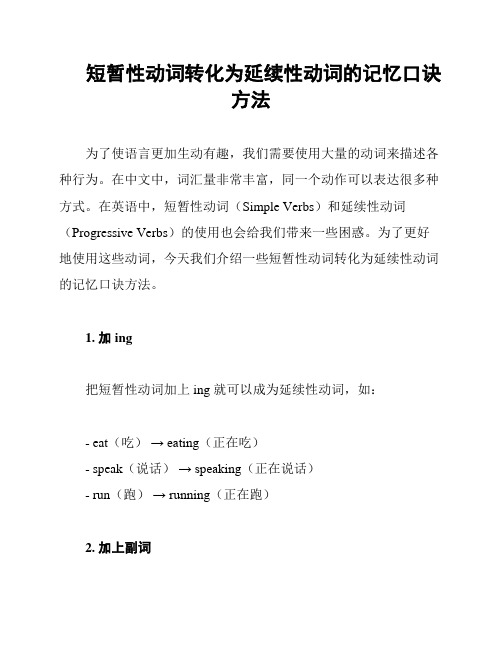
短暂性动词转化为延续性动词的记忆口诀
方法
为了使语言更加生动有趣,我们需要使用大量的动词来描述各种行为。
在中文中,词汇量非常丰富,同一个动作可以表达很多种方式。
在英语中,短暂性动词(Simple Verbs)和延续性动词(Progressive Verbs)的使用也会给我们带来一些困惑。
为了更好地使用这些动词,今天我们介绍一些短暂性动词转化为延续性动词的记忆口诀方法。
1. 加 ing
把短暂性动词加上 ing 就可以成为延续性动词,如:
- eat(吃)→ eating(正在吃)
- speak(说话)→ speaking(正在说话)
- run(跑)→ running(正在跑)
2. 加上副词
有些短暂性动词虽然不能直接加上 ing,但加上一些副词却可
以变成延续性动词,如:
- work(工作)→ work hard(努力工作)
- drive(开车)→ drive slowly(慢慢开车)
- walk(步行)→ walk quickly(快速行走)
3. 加上一些介词短语
通过加上一些介词短语也可以将短暂性动词转化为延续性动词,如:
- talk(交谈)→ ta lk about politics(谈论政治)
- wait(等待)→ wait for the bus(等待公交车)
- smile(微笑)→ smile at her(对她微笑)
使用记忆口诀方法可以更快地掌握英语动词的使用技巧,提高
我们的语言运用能力。
希望以上介绍的方法可以对大家的学习有所
帮助。
现在完成时中瞬间动词变延续性动词总结
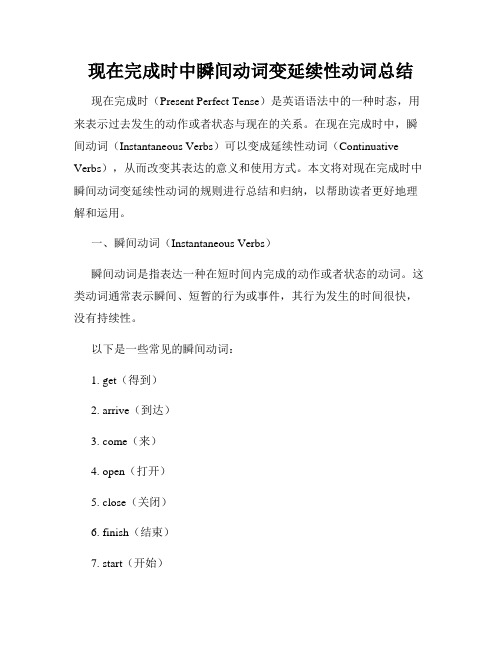
现在完成时中瞬间动词变延续性动词总结现在完成时(Present Perfect Tense)是英语语法中的一种时态,用来表示过去发生的动作或者状态与现在的关系。
在现在完成时中,瞬间动词(Instantaneous Verbs)可以变成延续性动词(Continuative Verbs),从而改变其表达的意义和使用方式。
本文将对现在完成时中瞬间动词变延续性动词的规则进行总结和归纳,以帮助读者更好地理解和运用。
一、瞬间动词(Instantaneous Verbs)瞬间动词是指表达一种在短时间内完成的动作或者状态的动词。
这类动词通常表示瞬间、短暂的行为或事件,其行为发生的时间很快,没有持续性。
以下是一些常见的瞬间动词:1. get(得到)2. arrive(到达)3. come(来)4. open(打开)5. close(关闭)6. finish(结束)7. start(开始)8. buy(购买)9. sell(出售)10. win(赢得)等等。
二、瞬间动词变延续性动词的规则现在完成时中,瞬间动词可以通过一些规则变成延续性动词,从而具有持续性。
一般而言,瞬间动词变延续性动词的方式有两种:添加辅助动词"have been"或使用"for"或"sice"引导的时间状语从句。
1. 添加辅助动词"have been"瞬间动词可以通过在其前面添加"have been"来表示一个动作或状态的持续性。
这种形式常常用于描述一个从过去某个时间开始一直延续到现在的动作或状态。
例如:- I have been living in this city for three years.(我在这个城市生活已经三年了。
)- He has been working on this project all day.(他从早到晚一直在做这个项目。
短暂性动词与延续性动词语法讲解
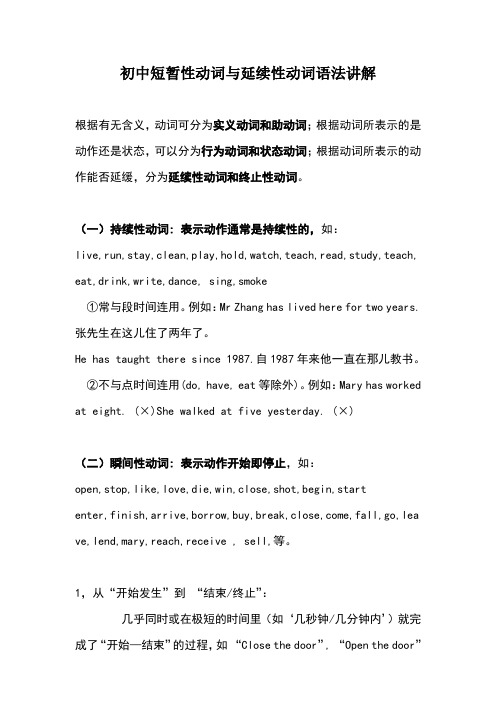
初中短暂性动词与延续性动词语法讲解根据有无含义,动词可分为实义动词和助动词;根据动词所表示的是动作还是状态,可以分为行为动词和状态动词;根据动词所表示的动作能否延缓,分为延续性动词和终止性动词。
(一)持续性动词: 表示动作通常是持续性的,如:live,run,stay,clean,play,hold,watch,teach,read,study,teach, eat,drink,write,dance, sing,smoke①常与段时间连用。
例如:Mr Zhang has lived here for two years.张先生在这儿住了两年了。
He has taught there since 1987.自1987年来他一直在那儿教书。
②不与点时间连用(do, have, eat等除外)。
例如:Mary has worked at eight. (×)She walked at five yesterday. (×)(二)瞬间性动词: 表示动作开始即停止,如:open,stop,like,love,die,win,close,shot,begin,startenter,finish,arrive,borrow,buy,break,close,come,fall,go,lea ve,lend,mary,reach,receive , sell,等。
1,从“开始发生”到“结束/终止”:几乎同时或在极短的时间里(如‘几秒钟/几分钟内’)就完成了“开始—结束”的过程,如“Close the door”, “Open the door”2,有些瞬间动词的“开始—结束的过程”可能稍微长一些,但也不会很长的,如,“buy sth(买下)”:付了款、拿了发票即完成了。
所以,“我买了这块手表5年了”,在汉语中说的通,但英语的表达就不能说:I have bought the watch for five years.buy sth ---- have sth (拥有)---have/has + had sth for…A: I have had the watch for 5 years.B: It is (has been) five years since I bought the watch. C: I bought it 5 years ago.同理,“borrow sth”“借书”在办理了相关的‘登记’手续后就结束了,不可能“借”几个星期或好几年的!汉语“这本书我已经借用了2星期了。
经典:八年级英语瞬间动词与延续性动词

• become interested in → be interested in
• 不要忘记把转换过的动词变为过去分词
7
将下列句子变为现在完成时
• 1.He got to Beijing five days ago. He __h_a_s_ __b_e_e_n_ ___in___ Beijing for __fiv_e___d_a_y_s___.
11
• 6) They married in 1991. • They __h_a_v_e_ _b_e_e_n___ma_r_ri_e_d____since _1_9_9_1___. • 7) He got to Beijing five minutes ago. • He ____h_a_s _b_e_e_n__ _in______ Beijing for __fi_v_e__m_in_u_t_e_s_. • 8) I bought a pen two hours ago. • I ___h_a_v_e_ _ke_p_t____ a pen for ___tw__o_ _h_ou_r_s____. • 9) They came here last week. • They ___h_a_ve__b_e_e_n____ here since ___la_s_t__w_e_ek______. • 10) I became a teacher in 2000. • I ___h_av_e_b_e_en______ a teacher for __el_e_v_en__ _y_ea_r_s___.
4
• 1. He has died for three years. • 2. He has been dead for three years. • 哪个正确?
瞬间动词和延续性动词.

一.瞬间动词和延续性动词的含义及用法瞬间动词(非延续性动词或短暂性动词):是指动作在很短时间内完成, 无延续性。
如come go 等终止性动词和延续性动词:延续性动词: live ,run, stay, clean ,play ,hold ,watch ,teach, read ,study,teach ,eat ,drink ,write ,dance , sing ,smoke瞬间性动词:open, stop ,like ,love ,die ,win ,close ,shot ,begin ,start enter ,finish1. 终止性动词:表示不能延续的动作,即动作发生后立即结束。
如:begin,arrive,borrow,buy ,break,close,come,fall,dic,finish,go,leave,lend,mary,reach,receiv e,open,sell ,start,stop 等。
终止性动词的肯定式是不能持续的,所以不能和表示一段时间的状语连用,终止性的否定式就可以和表一段时间的状语连用,因为否定本身就是可以延续的。
如:have a cold是持续性动词,表示“状态”,可与表延续性的时间状语连用,不定冠词不能省略。
I ′ve had a cold since my arrival.I didn′t go to school because I had had a bad cold for days.catch / take ,get a cold是短暂性动作,表“动态”:它不能和延续性时间状语连用,不定冠词“a ”可有可无,catch 可用代替。
Put on your coat ,or you′ll catch / take / get a cold.Take care not to get cold.但是,若cold 前有形容词修饰时,则不定冠词不能省。
初中英语语法 瞬时间动词与延续性动词
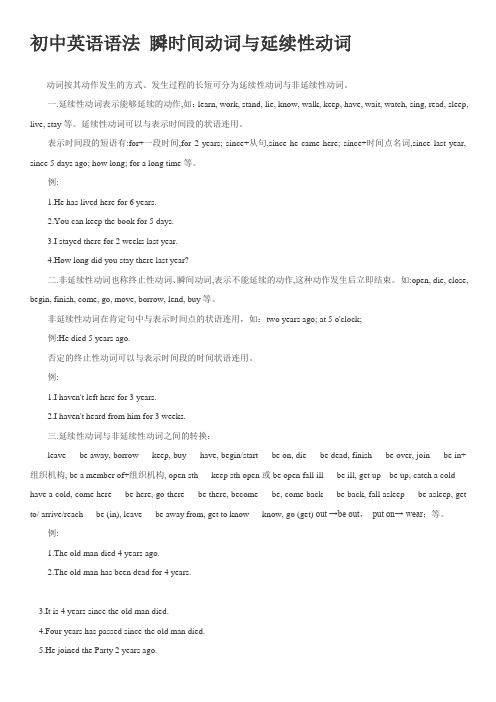
初中英语语法瞬时间动词与延续性动词动词按其动作发生的方式、发生过程的长短可分为延续性动词与非延续性动词。
一.延续性动词表示能够延续的动作,如:learn, work, stand, lie, know, walk, keep, have, wait, watch, sing, read, sleep, live, stay等。
延续性动词可以与表示时间段的状语连用。
表示时间段的短语有:for+一段时间,for 2 years; since+从句,since he came here; since+时间点名词,since last year, since 5 days ago; how long; for a long time等。
例:1.He has lived here for 6 years.2.You can keep the book for 5 days.3.I stayed there for 2 weeks last year.4.How long did you stay there last year?二.非延续性动词也称终止性动词、瞬间动词,表示不能延续的动作,这种动作发生后立即结束。
如:open, die, close, begin, finish, come, go, move, borrow, lend, buy等。
非延续性动词在肯定句中与表示时间点的状语连用,如:two years ago; at 5 o'clock;例:He died 5 years ago.否定的终止性动词可以与表示时间段的时间状语连用。
例:1.I haven't left here for 3 years.2.I haven't heard from him for 3 weeks.三.延续性动词与非延续性动词之间的转换:leave --- be away, borrow --- keep, buy --- have, begin/start --- be on, die --- be dead, finish --- be over, join --- be in+组织机构, be a member of+组织机构, open sth --- keep sth open或be open fall ill --- be ill, get up---be up, catch a cold --- have a cold, come here --- be here, go there --- be there, become --- be, come back --- be back, fall asleep --- be asleep, get to/ arrive/reach --- be (in), leave --- be away from, get to know --- know, go (get) out →be out,put on→ wear;等。
现在完成时态的动词转换
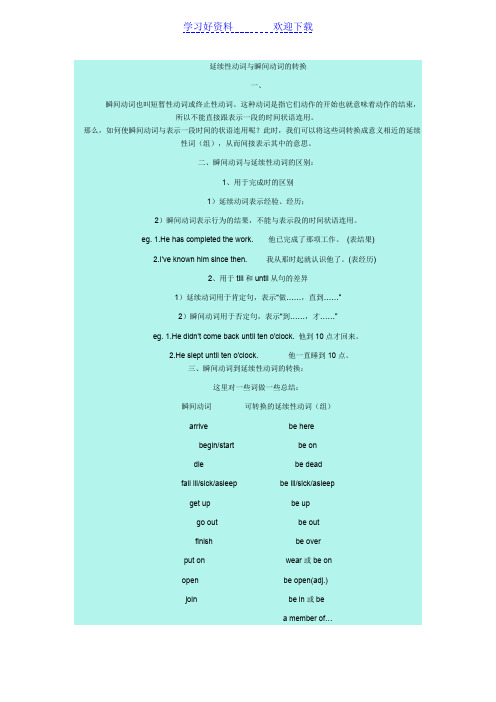
延续性动词与瞬间动词的转换一、瞬间动词也叫短暂性动词或终止性动词。
这种动词是指它们动作的开始也就意味着动作的结束,所以不能直接跟表示一段的时间状语连用。
那么,如何使瞬间动词与表示一段时间的状语连用呢?此时,我们可以将这些词转换成意义相近的延续性词(组),从而间接表示其中的意思。
二、瞬间动词与延续性动词的区别:1、用于完成时的区别1)延续动词表示经验、经历;2)瞬间动词表示行为的结果,不能与表示段的时间状语连用。
eg. 1.He has completed the work.他已完成了那项工作。
(表结果)2.I've known him since then.我从那时起就认识他了。
(表经历)2、用于till和until从句的差异1)延续动词用于肯定句,表示“做……,直到……”2)瞬间动词用于否定句,表示“到……,才……”eg. 1.He didn't come back until ten o'clock. 他到10点才回来。
2.He slept until ten o'clock.他一直睡到10点。
三、瞬间动词到延续性动词的转换:这里对一些词做一些总结:瞬间动词可转换的延续性动词(组)arrive be herebegin/start be ondie be deadfall ill/sick/asleep be ill/sick/asleepget up be upgo out be outfinish be overput on wear或be onopen be open(adj.)join be in或bea member of…close be closedgo to school be a studentborrow keepbuy havecatch(a cold) have(a cold)get to know knowbegin to study studycome to work workget up be upleave be away from等如:1.He has been a soldier for three years. 他参军三年了。
短暂性动词与延续性动词语法讲解
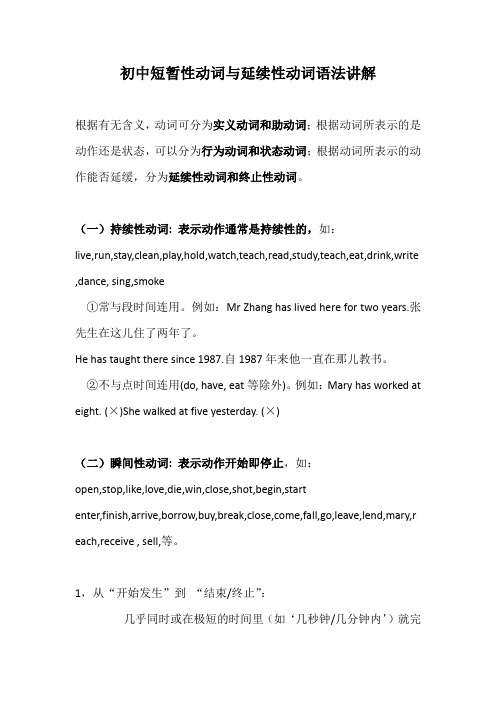
初中短暂性动词与延续性动词语法讲解根据有无含义,动词可分为实义动词和助动词;根据动词所表示的是动作还是状态,可以分为行为动词和状态动词;根据动词所表示的动作能否延缓,分为延续性动词和终止性动词。
(一)持续性动词: 表示动作通常是持续性的,如:live,run,stay,clean,play,hold,watch,teach,read,study,teach,eat,drink,write ,dance, sing,smoke①常与段时间连用。
例如:Mr Zhang has lived here for two years.张先生在这儿住了两年了。
He has taught there since 1987.自1987年来他一直在那儿教书。
②不与点时间连用(do, have, eat等除外)。
例如:Mary has worked at eight. (×)She walked at five yesterday. (×)(二)瞬间性动词: 表示动作开始即停止,如:open,stop,like,love,die,win,close,shot,begin,startenter,finish,arrive,borrow,buy,break,close,come,fall,go,leave,lend,mary,r each,receive , sell,等。
1,从“开始发生”到“结束/终止”:几乎同时或在极短的时间里(如‘几秒钟/几分钟内’)就完成了“开始—结束”的过程,如“Close the door”, “Open the door”2,有些瞬间动词的“开始—结束的过程”可能稍微长一些,但也不会很长的,如,“buy sth(买下)”:付了款、拿了发票即完成了。
所以,“我买了这块手表5年了”,在汉语中说的通,但英语的表达就不能说:I have bought the watch for five years.buy sth ---- have sth (拥有)---have/has + had sth for…A: I have had the watch for 5 years.B: It is (has been) five years since I bought the watch.C: I bought it 5 years ago.同理,“borrow sth”“借书”在办理了相关的‘登记’手续后就结束了,不可能“借”几个星期或好几年的!汉语“这本书我已经借用了2星期了。
英语中存在短暂性动词
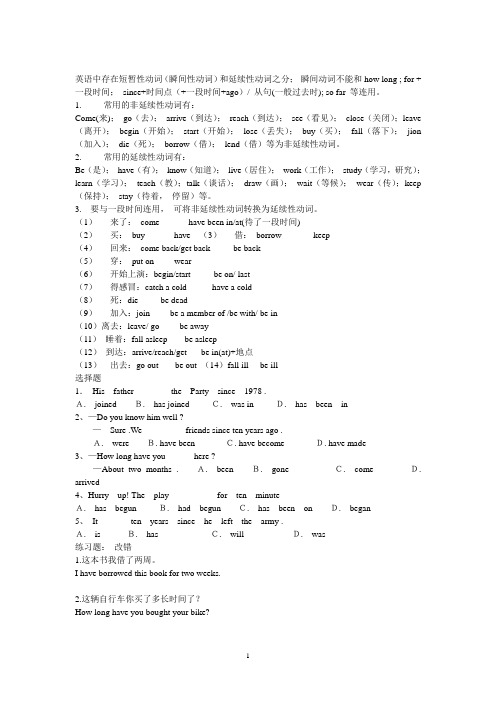
英语中存在短暂性动词(瞬间性动词)和延续性动词之分;瞬间动词不能和how long ; for +一段时间;since+时间点(+一段时间+ago)/ 从句(一般过去时); so far 等连用。
1. 常用的非延续性动词有:Come(来);go(去);arrive(到达);reach(到达);see(看见);close(关闭);leave (离开);begin(开始);start(开始);lose(丢失);buy(买);fall(落下);jion (加入);die(死);borrow(借);lend(借)等为非延续性动词。
2. 常用的延续性动词有:Be(是);have(有);know(知道);live(居住);work(工作);study(学习,研究);learn(学习);teach(教);talk(谈话);draw(画);wait(等候);wear(传);keep (保持);stay(待着,停留)等。
3. 要与一段时间连用,可将非延续性动词转换为延续性动词。
(1)来了:come----------have been in/at(待了一段时间)(2)买:buy----------have (3)借:borrow-----------keep(4)回来:come back/get back--------be back(5)穿:put on-------wear(6)开始上演:begin/start--------be on/ last(7)得感冒:catch a cold-------- have a cold(8)死:die -------be dead(9)加入:join-------be a member of /be with/ be in(10)离去:leave/ go-------be away(11)睡着:fall asleep------be asleep(12)到达:arrive/reach/get-----be in(at)+地点(13)出去:go out -----be out (14)fall ill----be ill选择题1.His father ______ the Party since 1978 .A. joined B. has joined C. was in D. has been in2、—Do you know him well ?—Sure .We _________ friends since ten years ago .A. were B. have been C. have become D. have made3、—How long have you ____ here ?—About two months .A. been B. gone C. come D. arrived4、Hurry up! The play __________ for ten minuteA. has begun B. had begunC. has been on D. began5、It _____ ten years since he left the army .A. is B. has C. will D. was练习题:改错1.这本书我借了两周。
动词分类(瞬间动词延续性动词)
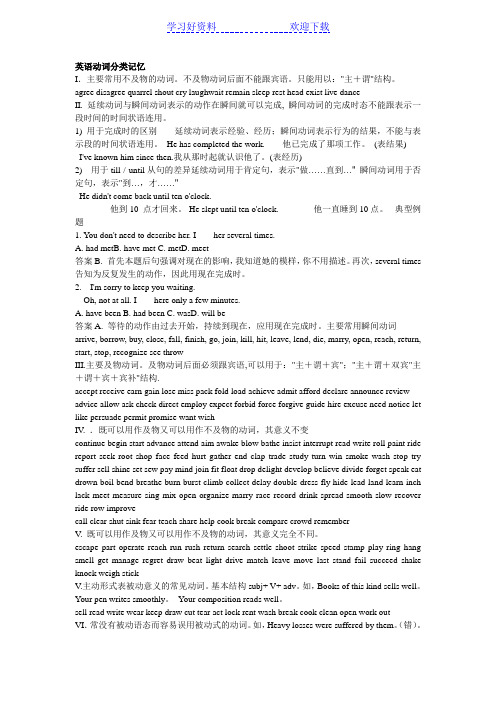
英语动词分类记忆I.主要常用不及物的动词。
不及物动词后面不能跟宾语。
只能用以:"主+谓"结构。
agree disagree quarrel shout cry laughwait remain sleep rest head exist live danceII. 延续动词与瞬间动词表示的动作在瞬间就可以完成, 瞬间动词的完成时态不能跟表示一段时间的时间状语连用。
1) 用于完成时的区别延续动词表示经验、经历;瞬间动词表示行为的结果,不能与表示段的时间状语连用。
He has completed the work.他已完成了那项工作。
(表结果)I've known him since then.我从那时起就认识他了。
(表经历)2)用于till / until从句的差异延续动词用于肯定句,表示"做……直到…" 瞬间动词用于否定句,表示"到…,才……"He didn't come back until ten o'clock.他到10 点才回来。
He slept until ten o'clock.他一直睡到10点。
典型例题1. You don't need to describe her. I ___ her several times.A. had metB. have metC. metD. meet答案B. 首先本题后句强调对现在的影响,我知道她的模样,你不用描述。
再次,several times 告知为反复发生的动作,因此用现在完成时。
2.---I'm sorry to keep you waiting.---Oh, not at all. I ___ here only a few minutes.A. have beenB. had beenC. wasD. will be答案A. 等待的动作由过去开始,持续到现在,应用现在完成时。
- 1、下载文档前请自行甄别文档内容的完整性,平台不提供额外的编辑、内容补充、找答案等附加服务。
- 2、"仅部分预览"的文档,不可在线预览部分如存在完整性等问题,可反馈申请退款(可完整预览的文档不适用该条件!)。
- 3、如文档侵犯您的权益,请联系客服反馈,我们会尽快为您处理(人工客服工作时间:9:00-18:30)。
将下列句子变为现在完成时
• 1.He got to Beijing five days ago. He _____ ______ ______ Beijing for ______ days ______. has been in five • 2.I became a teacher in 2000. • I ______ been ________ a teacher for _______ _______. has eleven years • 3.The shop closed two hours ago. has been two hours • The shop ______ _______ closed for _______ ______. ______ • 4.He left Fuzhou just now. • He _____ ______ ______ _______ Fuzhou for five has been away from minutes. • 5.They borrowed it last week. have a week • They ________had / kept it for ________ _________. _______
划线提问
• • • • • • • • • • 1) I have been there for two days. ______ long have How ______ ______ you _______ _______ ? been there 2) My father has lived here since 2000. How long ______ your father ______ _______? lived here _____ _____ has 3) He left here yesterday. When leave here _________did ________ he ________ _________? 4) They bought a book two hours ago. When did buy __________ ___________ they __________ a book? 5. He has been there twice. (划线提问) How many _______ _______ times _______ he been there? _____ has
• • • • • • • • • •
6) They married in 1991. have been married 1991 They ______ _______ ________since _______. 7) He got to Beijing five minutes ago. He ______ ______ _______ Beijing for ______ ______. has been in five minutes 8) I bought a pen two hours ago. have kept two hours I _______ _______ a pen for ______ ________. 9) They came here last week. have _______ here since _______ ________. last week They _______ been 10) I became a teacher in 2000. have ________ a teacher for _______ _______. I ______been eleven years
延续性动词
• 也叫可持续性动词。表示动作的完成可以持续一 段时间。 • 常见的延续性动词:work, live, stay, teach, study, run, read, write等。
• They have studied English for 8 years.
• 1. He has died for three years. • 2. He has been dead for three years. • 哪个正确? • 句1中die表示的是死这个动作,而死这个动作是非 延续的,不可能持续三年;而句2中用be dead这个 表示状态的,将非延续性动词进行了转化。
• 11) The river became dirty last year. • The river ______ _____ dirty for _____year has been a _____. • 12) My brother joined the army two years ago. • My brother ______been _______ in _______ army ______ for has the two years. • 13) I began to teach at this school in 1995. have ____ • I ____ taught at this school since 1995 ____. • 14) They borrowed it last week. have last • They _______ kept _______ it since ________week ________. • 15) I got to know him last year. have known last year • I _______ _______ him since _______ ________. • 16) He joined the league in 2009. has been league member • He ______ _______ a _______ _______ for two years. • He _______ _______ ______ the League for two has been in years.
延续性动词
be dead keep/have have be up be in be away (from) be out be back be over be married
• • • • • • • • • • • • •
open → be open close → be closed begin /start → be on begin to study →study get to know →know join → be in 或 be a member of… reach get to → be in + 地点 arrive in/at put on →wear 或be on fall ill (asleep) → be ill (asleep) become interested in → be interested in 不要忘记把转换过的动词变为过去分词
瞬间动词
• 表示动作的完成只是在瞬间,并不能持续一段时 间,这样的动词便是瞬间动词。 • 常见瞬间动词:die, borrow, buy, get up, come, leave,
finish, open, close, get to, reach, join
• 这些动词不能用在完成时中与段时间状语(since 、 for)连用。
短暂性动词转换为延续性动词
• • • • • • • • • • 1) The shop closed two hours ago. has _____ ______ for _______ ______. two hours The shop _____been closed 2) The door opened at six in the morning. has been open The door _______ _______ _______ for six hours. 3) He left Fuzhou just now. has been from He _____ ______ away ______ _______ Fuzhou for five minutes. 4) My grandpa died in 2001. has _____ ______for ______ ______. ten years My grandpa _____ been dead 5) The meeting finished at six. has been The meeting ________ ______over ______ for six hours.
现在完成时中的 瞬间动词与延续性动词
完成时中,肯定句,疑问句中谓语动词必须是延续性动词 1)I‘ve lived here since 1990.(自从1990年以来我就住在这里) = I've lived here for 21 years. 2)Mr Wang has worked in the factory since he came to the city . (自从到这个城市以来,王先生一直在这家工厂工作) ( ) 注意:在这类句子的肯定句和疑问句中谓语动词必须用延续性 动词。短暂性动词由于动作不能持续,故不能与for或since引 出的时间状语连用。 但是 I haven't seen him for three years .我三年没有看见他 了
• 结论:非延续性动词(即瞬间动词)不能用在完成
时中与表示段时间的for……和since……连用,而要 进行转化。
瞬间动词向延续性动词的转化
• 短暂性动词
• • • • • • • • • • die → borrow → buy → get up → come → leave → go out → come back → finish → Marry ----
用过去时或现在完成时填空:
• • • • •
